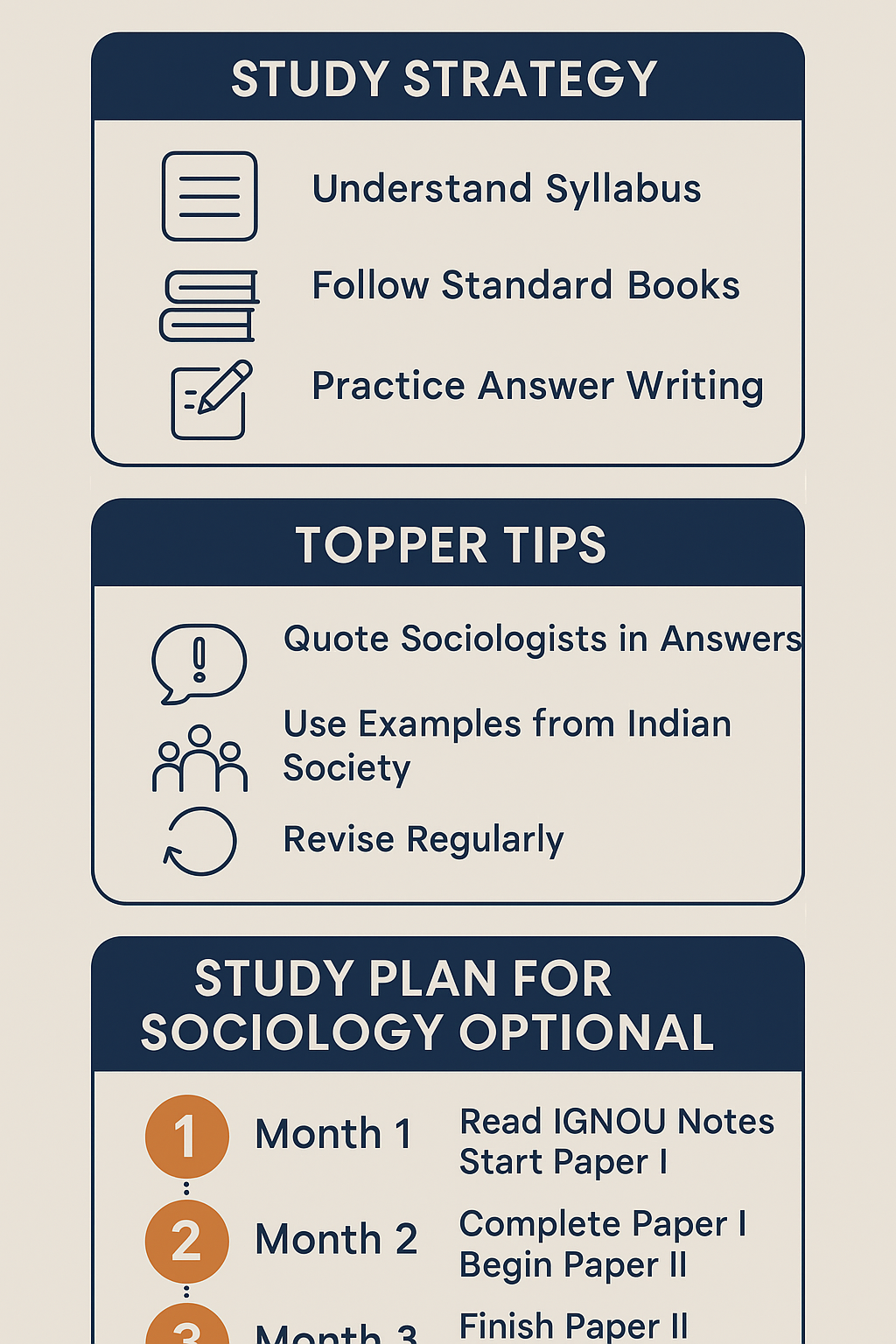
16 May How to prepare for Sociology optional? Study plan for Sociology Optional
How to Prepare for Sociology Optional for UPSC CSE
Why Choose Sociology Optional for UPSC?
Sociology is one of the most popular optional subjects in the UPSC Civil Services Examination. It is chosen not only by students from humanities backgrounds but also by engineers, doctors, and science graduates. Here’s why:
- Short and concise syllabus
- Overlaps with GS papers and Essay
- Easy to understand concepts, even for non-arts students
- Scoring potential with proper presentation
Understanding the Syllabus
The Sociology Optional syllabus is divided into two papers:
- Paper I: Fundamentals of Sociology – covers thinkers, sociological concepts, and theories.
- Paper II: Indian Society – includes social issues, changes, institutions, and challenges specific to India.
You can download the official UPSC syllabus from UPSC.gov.in.
Best Books and Sources for Sociology Optional
Here is a list of standard sources recommended by toppers:
- Paper I:
- Haralambos and Holborn (Blue Book)
- IGNOU BA Sociology Notes
- Ritzer’s Sociological Theory (selected topics)
- Paper II:
- Indian Sociological Thought – Nadeem Hasnain
- Social Change in Modern India – M.N. Srinivas
- Current Affairs from newspapers like The Hindu and Indian Express
Notes by Dr. Huma Hassan from PlutusIAS are also highly recommended by students for both conceptual clarity and exam-oriented preparation.
Answer Writing Strategy
Writing answers in Sociology requires a blend of theoretical understanding and real-world application. Follow these tips:
- Always quote thinkers and sociologists to substantiate your points.
- Use examples from Indian society, current events, and surveys (like NFHS, NCRB).
- Structure answers with an introduction, body (theory + examples), and a brief conclusion.
- Practice answer writing using test series such as the PlutusIAS Sociology Test Series.
Study Plan for Sociology Optional (6 Months)
Here’s a practical study plan to complete Sociology Optional preparation within 6 months:
Month 1: Basic Understanding
- Read IGNOU BA Sociology notes
- Cover Paper I Unit 1 to 3 (Sociology as Science, Thinkers, Social Institutions)
- Watch topper strategy videos and mentorship sessions
Month 2: Build Conceptual Foundation
- Complete rest of Paper I (Stratification, Power, Change)
- Start Paper II (Indian Society – Basics, Structure, Social Institutions)
- Practice 2-3 answers per week
Month 3: Deepen Understanding
- Finish Paper II (Tribes, Caste, Religion, Social Change)
- Revise Paper I concepts
- Start Paper II answer writing
Month 4: Test Series & Case Studies
- Join Sociology Test Series (PlutusIAS or other reputed ones)
- Analyze feedback and improve structure and presentation
- Use real-life examples from India
Month 5: Revision & Model Answers
- Revise key thinkers and theories
- Memorize important keywords, definitions, and quotations
- Practice writing one full-length test weekly
Month 6: Final Brush-up
- Revise all notes
- Write answers to PYQs (Past Year Questions)
- Practice time-bound mock tests
Additional Tips from Toppers
- Make concise notes – especially for Paper II where current affairs integration is key
- Watch free video lectures on TheHinduZone and PlutusIAS
- Revise thinkers regularly
- Attempt sectional tests before moving to full-length mocks
Conclusion
Sociology is a high-scoring optional when approached with a structured plan and consistent answer writing. The subject not only helps in the Mains exam but also enriches your Essay and Interview preparation. With the right guidance and smart work, you can easily score above 280 marks in Sociology optional.
Start today with proper mentorship, and let your UPSC CSE journey be fueled by the scientific understanding of society!




No Comments